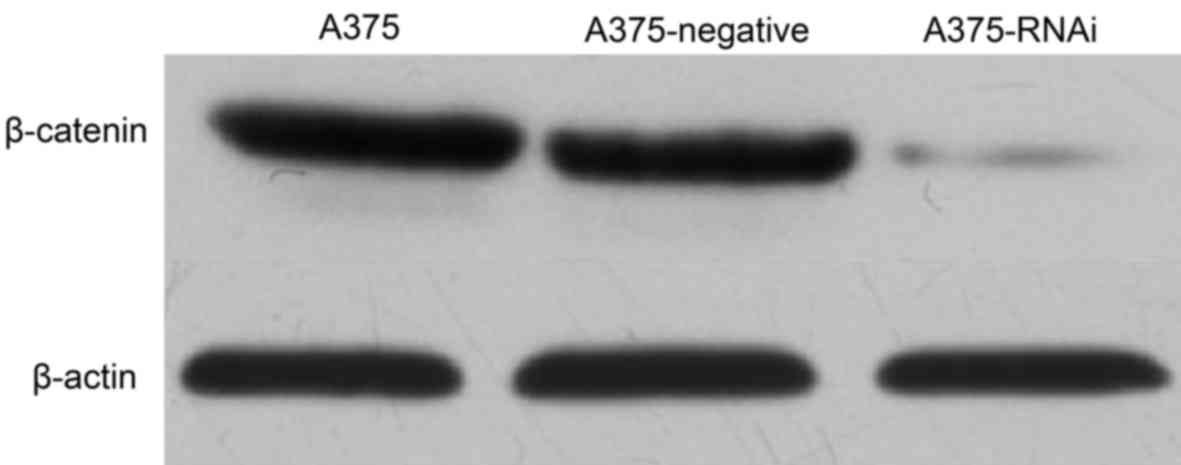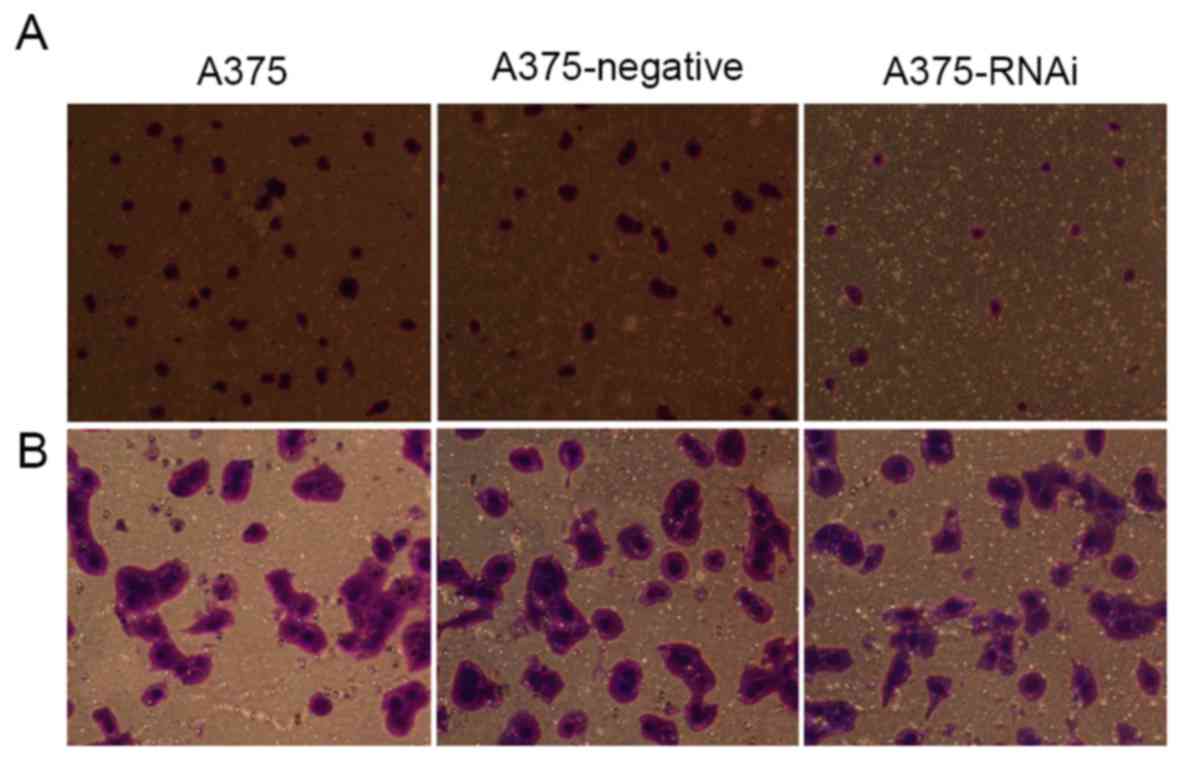|
1
|
Erdmann F, Lortettieulent J, Schüz J, Zeeb
H, Greinert R, Breitbart EW and Bray F: International trends in the
incidence of malignant melanoma 1953–2008-are recent generations at
higher or lower risk? Int J Cancer. 132:385–400. 2013. View Article : Google Scholar : PubMed/NCBI
|
|
2
|
Chang JW, Yeh KY, Wang CH, Yang TS, Chiang
HF, Wei FC, Kuo TT and Yang CH: Malignant melanoma in Taiwan: A
prognostic study of 181 cases. Melanoma Res. 14:537–541. 2004.
View Article : Google Scholar : PubMed/NCBI
|
|
3
|
Perlis C and Herlyn M: Recent advances in
melanoma biology. Oncologist. 9:182–187. 2004. View Article : Google Scholar : PubMed/NCBI
|
|
4
|
Miao Y, Owen NK, Whitener D, Gallazzi F,
Hoffman TJ and Quinn TP: In vivo evaluation of 188Re-labeled
alpha-melanocyte stimulating hormone peptide analogs for melanoma
therapy. Int J Cancer. 101:480–187. 2002. View Article : Google Scholar : PubMed/NCBI
|
|
5
|
Delmas V, Beermann F, Martinozzi S,
Carreira S, Ackermann J, Kumasaka M, Denat L, Goodall J, Luciani F,
Viros A, et al: Beta-catenin induces immortalization of melanocytes
by suppressing p16INK4a expression and cooperates with N-Ras in
melanoma development. Genes Dev. 21:2923–2935. 2007. View Article : Google Scholar : PubMed/NCBI
|
|
6
|
Chin L, Garraway LA and Fisher DE:
Malignant melanoma: Genetics and therapeutics in the genomic era.
Genes Dev. 20:2149–2182. 2006. View Article : Google Scholar : PubMed/NCBI
|
|
7
|
Lens MB, Dawes M, Goodacre T and Bishop
JA: Excision margins in the treatment of primary cutaneous
melanoma: A systematic review of randomized controlled trials
comparing narrow vs. wide excision. Arch Surg. 137:1101–1105. 2002.
View Article : Google Scholar : PubMed/NCBI
|
|
8
|
Zhou Qian QH, Yao X, Zhu M and Jiang Y:
Clinical pathological analysis of 29 cases of cutaneous malignant
melanoma. Guide of China Medicine. 6:20–22. 2008.(In Chinese).
|
|
9
|
Chien AJ, Moore EC, Lonsdorf AS,
Kulikauskas RM, Rothberg BG, Berger AJ, Major MB, Hwang ST, Rimm DL
and Moon RT: Activated Wnt/ß-catenin signaling in melanoma is
associated with decreased proliferation in patient tumors and a
murine melanoma model. Proc Natl Acad Sci USA. 106:1193–1198. 2009.
View Article : Google Scholar : PubMed/NCBI
|
|
10
|
Ciolczyk-Wierzbicka D, Gil D and Laidler
P: The inhibition of cell proliferation using silencing of
N-cadherin gene by siRNA process in human melanoma cell lines. Curr
Med Chem. 19:145–151. 2012. View Article : Google Scholar : PubMed/NCBI
|
|
11
|
Niu LL and Hao J: Rosiglitazone inhibition
of A375 human malignant melanoma cell invasion. Chinese J Dermatol.
42:831–834. 2009.
|
|
12
|
Riccardo F, Iussich S, Maniscalco L,
Mayayo SL, Rosa GL, Arigoni M, Maria RD, Gattino F, Lanzardo S,
Lardone E, et al: CSPG4-specific immunity and survival prolongation
in dogs with oral malignant melanoma immunized with human CSPG4
DNA. Clin Cancer Res. 20:3753–3762. 2014. View Article : Google Scholar : PubMed/NCBI
|
|
13
|
Rappa G, Mercapide J, Anzanello F, Le TT,
Mary G, Johlfs RRF, Wilsch-Bräuninger M, Corbeil D and Loricoa A:
Wnt interaction and extracellular release of prominin-1/CD133 in
human malignant melanoma cells. Exp Cell Res. 319:810–819. 2013.
View Article : Google Scholar : PubMed/NCBI
|
|
14
|
Tarapore RS, Siddiqui IA, Saleem M,
Spiegelman V and Mukhtar H: Abstract 3794: Growth inhibition of
human melanoma cells in vitro and in vivo by lupeol is associated
with inhibition of Wnt/β-catenin signaling. Cancer Res. 70
Suppl:S37942010. View Article : Google Scholar
|
|
15
|
Katiyar SK and Vaid M: Abstract 3683:
Bioactive phytochemical proanthocyanidins target β-catenin
signaling in preventing invasive potential of human melanoma cells.
Cancer Res. 73 Suppl:S36832013. View Article : Google Scholar
|
|
16
|
Widlund HR, Horstmann MA, Price ER, Cui J,
Lessnick SL, Wu M, He X and Fisher DE: β-Catenin-induced melanoma
growth requires the downstream target Microphthalmia-associated
transcription factor. J Cell Biol. 158:1079–1087. 2002. View Article : Google Scholar : PubMed/NCBI
|
|
17
|
Beck D, Niessner H, Krieg K, Gogel J,
Bonin M, Garbe C and Meier F: Chemosensitizing activity of the mTOR
inhibitor temsirolimus (Torisel) in metastatic melanoma involves
DKK1. Journal der Deutschen Dermatologischen Gesellschaft. 11:6.
2013.
|
|
18
|
Mikheev AM, Mikheeva SA, Rostomily R and
Zarbl H: Dickkopf-1 activates cell death in MDA-MB435 melanoma
cells. Biochem Biophys Res Commun. 352:675–680. 2007. View Article : Google Scholar : PubMed/NCBI
|
|
19
|
Pawlikowski JS, Mcbryan T, Van TJ, Drotar
ME, Hewitt RN, Maier AB, King A, Blyth K, Wu H and Adams PD: Wnt
signaling potentiates nevogenesis. Proc Natl Acad Sci USA.
110:16009–16014. 2013. View Article : Google Scholar : PubMed/NCBI
|
|
20
|
Mælandsmo GM, Holm R, Nesland JM, Fodstad
Ø and Flørenes VA: Reduced β-catenin expression in the cytoplasm of
advanced-stage superficial spreading malignant melanoma. Clin
Cancer Res J Am Assoc Cancer Res. 9:3383–3388. 2003.
|
|
21
|
Cimetta E, Cannizzaro C, James R, Biechele
T, Moon RT, Elvassore N and Vunjak-Novakovic G: Microfluidi device
generating stable concentration gradients for long term cell
culture: Application to Wnt3a regulation of β-catenin signaling.
Lab Chip. 10:3277–3283. 2010. View Article : Google Scholar : PubMed/NCBI
|
|
22
|
Comodo AN, Bachi ALL, Soares MF, Franco M,
de Paulo V and Teixeira C: Galectin-3 expression favors metastasis
in murine melanoma. Adv Biosci Biotechnol. 4:55–62. 2013.
View Article : Google Scholar
|
|
23
|
Shah PK, Walker MP, Sims CE, Major MB and
Allbritton NL: Dynamics and evolution of β-catenin-dependent Wnt
signaling revealed through massively parallel clonogenic screening.
Integr Biol. 6:673–684. 2014. View Article : Google Scholar
|
|
24
|
Tobias S, Moritz M, Daniel E and Birgit S,
Michael S, Martin S, Claus G and Birgit S: β-catenin signaling
increases during melanoma progression and promotes tumor cell
survival and chemoresistance. PloS One. 6:e234292011. View Article : Google Scholar : PubMed/NCBI
|
|
25
|
Dong F and Herlyn M: The dynamic roles of
cell-surface receptors in melanoma development. From Melanocytes to
Melanoma. 169–181. 2006.
|
|
26
|
Hsu MY, Ling L and Herlyn M: Cultivation
of normal human epidermal melanocytes in the absence of phorbol
esters. Methods Mol Med. 107:13–28. 2005.PubMed/NCBI
|
|
27
|
Tucci MG, Lucarini G, Brancorsini D, Zizzi
A, Pugnaloni A, Giacchetti A, Ricotti G and Biagini G: Involvement
of E-cadherin, β-catenin, Cdc42 and CXCR4 in the progression and
prognosis of cutaneous melanoma. Br J Dermatol. 157:1212–1216.
2007. View Article : Google Scholar : PubMed/NCBI
|
|
28
|
Kuno T, Tsukamoto T, Hara A and Tanaka T:
Cancer chemoprevention through the induction of apoptosis by
natural compounds. J Biophys Chem. 3:156–173. 2012. View Article : Google Scholar
|
|
29
|
Novellino L, De FA, Deho P, Perrone F,
Pilotti S, Parmiani G and Castelli C: PTPRK negatively regulates
transcriptional activity of wild type and mutated oncogenic
beta-catenin and affects membrane distribution of
beta-catenin/E-cadherin complexes in cancer cells. Cell Signal.
20:872–883. 2008. View Article : Google Scholar : PubMed/NCBI
|
|
30
|
Lee DJ, Kang DH, Choi M, Choi YJ, Lee JY,
Park JH, Park YJ, Lee KW and Kang SW: Peroxiredoxin-2 represses
melanoma metastasis by increasing E-Cadherin/β-Catenin complexes in
adherens junctions. Cancer Res. 73:4744–4757. 2013. View Article : Google Scholar : PubMed/NCBI
|
|
31
|
Pećina-Šlaus N, Žigmund M, Kušec V, Martić
TN, Čačić M and Šlaus M: E-cadherin and β-catenin expression
patterns in malignant melanoma assessed by image analysis. J Cutan
Pathol. 34:239–246. 2007. View Article : Google Scholar : PubMed/NCBI
|
|
32
|
Vaid M, Prasad R, Sun Q and Katiyar SK:
Silymarin targets β-catenin signaling in blocking
migration/invasion of human melanoma cells. PloS One. 6:e230002010.
View Article : Google Scholar
|
|
33
|
Damsky WE, Curley DP, Santhanakrishnan M,
Rosenbaum LE, Platt JT, Rothberg Gould BE, Taketo MM, Dankort D,
Rimm DL, McMahon M and Bosenberg M: β-catenin signaling controls
metastasis in Braf-activated Pten-deficient melanomas. Cancer Cell.
20:741–754. 2011. View Article : Google Scholar : PubMed/NCBI
|
|
34
|
Chon E, Thompson V, Schmid S and Stein TJ:
Activation of the canonical Wnt/β-catenin signalling pathway is
rare in canine malignant melanoma tissue and cell lines. J Comp
Pathol. 148:178–187. 2013. View Article : Google Scholar : PubMed/NCBI
|
|
35
|
Dang CV, O'Donnell KA, Zeller KI, Nguyen
T, Osthusa RC and Lia F: The c-Myc target gene network. Semin
Cancer Biol. 16:253–264. 2006. View Article : Google Scholar : PubMed/NCBI
|
|
36
|
Zeller KI, Zhao X, Lee CWH, Chiu KP, Yao
F, Yustein JT, Ooi HS, Orlov YL, Shahab A, Yong HC, et al: Global
mapping of c-Myc binding sites and target gene networks in human B
cells. Proc Natl Acad Sci USA. 103:17834–17839. 2006. View Article : Google Scholar : PubMed/NCBI
|
|
37
|
Schittek B and Sinnberg T: Biological
functions of casein kinase 1 isoforms and putative roles in
tumorigenesis. Mol Cancer. 13:2312014. View Article : Google Scholar : PubMed/NCBI
|

















